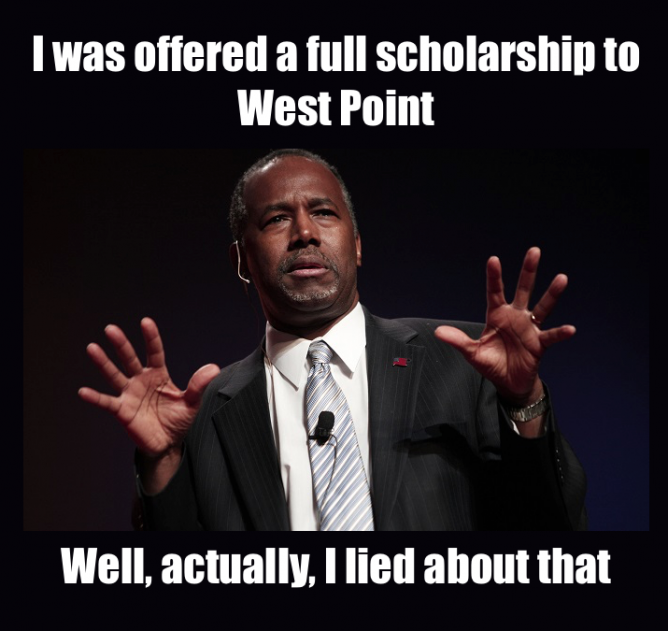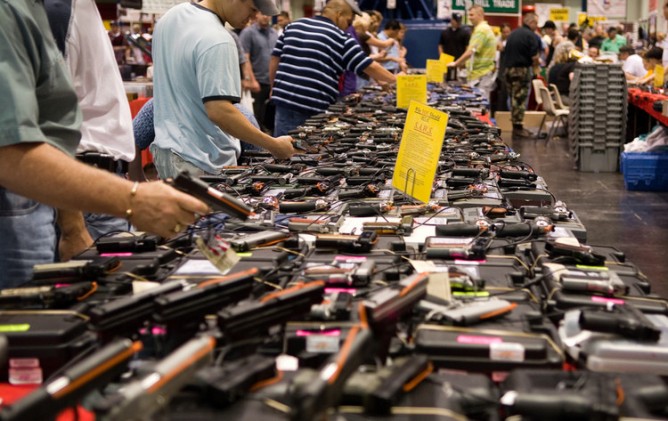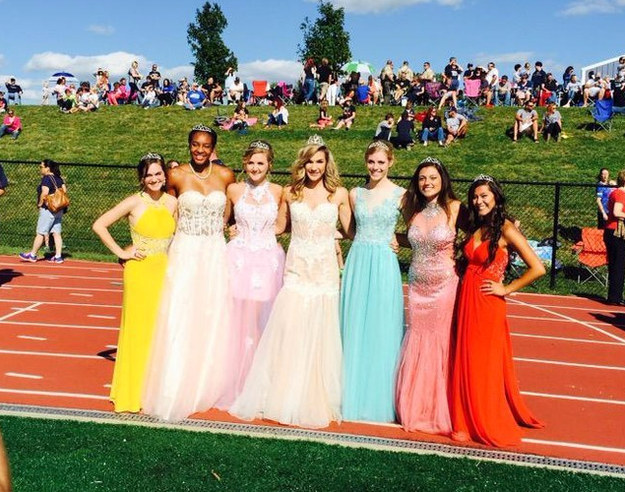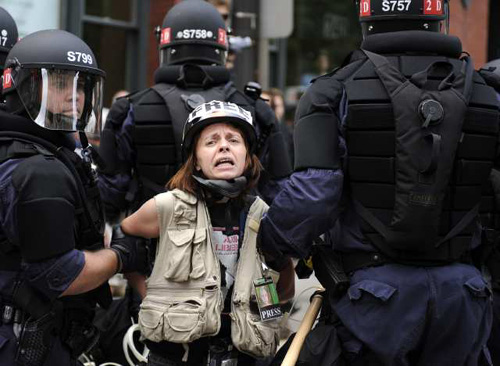SpaceX is doing some amazing things, and they are very close to getting this right. Good fort them:
I suspect the next attempt at doing this will go perfectly.
SpaceX is doing some amazing things, and they are very close to getting this right. Good fort them:
I suspect the next attempt at doing this will go perfectly.

… maybe they’ll actually do something about them.
Remember the Democratic and Republican party debates that were held just before that major international meeting about climate change, participated in by every country in the world? Of course you do. Do you remember the candidates’ responses to the questions about climate change posed during those debates? No, you don’t. Not a single question about climate change, or any other big science issue, was asked.
When we think about the big science issues, climate change is often one of the main topics that comes first to mind. But there are many other big science issues that should be more openly and full discussed by candidates in the ongoing US Presidential election, as well as other state and federal elections. ScienceDebate.org has been collecting questions by interested citizens. Here is a sampling (go HERE to see all the questions and submit your own).:
As Shawn Otto recently pointed out, science is central to a large number of our policy challenges, but there are almost no scientists in Congress (about a half dozen during any given term). In fact, we don’t necessarily need a lot more scientists in Congress, but we do need to have science savvy people in elected office. What better way is there to ensure a higher level of science awareness than to make science policy a normal part of our election cycles, through debates, policy statements, and the journalism that covers those elections?
ScienceDebate.Org has been pushing for an actual science debate for a few POTUS elections now. They have had great success in getting their message out … most people have heard of the organization by now. And, there have been some successes in getting the candidates to address science. For example, when President Obama was challenged by Governor Mitt Romney, the two of them produced science policy statements.
This year is different from previous years. For the first time, climate change, one of the big science issues, is part of several national level campaigns. Oddly, the US press seems to be moving very slowly in addressing the fact that more and more citizens are concerned about this and other science issues. But with a bit of a push, the big networks and major journalistic outlets can be convinced to press candidates to address these issues.
Look again at the list of science policy questions above. My impression is that when a lot of people hear about a science debate, they imagine something different, where the candidates are asked science questions, to test their science literacy. That is not what the sciencedebate.org project is about. Candidates for national office, as well as state and local office, are expected to understand economics, crime, international relations, health care, and all sorts of other academic areas. They are not tested on their ability to write the equation for Pareto Efficiency, tactical strategies for dealing with a hostage situation, to speak widely spoken foreign languages, or demonstrate that they can conduct a liver transplant. They are asked about policy, like those science questions listed above. Not only should candidates be able to do that, but the people who are considering voting for them (or not) should have a good idea of how a given candidate will address these issues, or at least, to have evidence that the candidates have more than a vague idea of what these issues entail.
Sheril Kirshenbaum notes,
On Wednesday we’ll watch another Republican presidential debate, but how much do you expect to hear about topics like mental health and climate change? Funding for biomedical research and energy? Research innovation and global leadership? Given these are the issues that will impact the way all Americans live for decades to come, why are they so often the exception in debates, rather than the expectation?
ScienceDebat.org has produced a very compelling commercial that makes this point, and if you agree (and you know you do!) please pass this around on the usual social media for people to see. Here it is:
Here is something you should know: “ScienceDebate.org and Research!America, a group that advocates for medical research, commissioned a national poll that showed that 87% of likely voters think the candidates ought to be well-versed on these issues. The group held online exchanges between President Obama and his opponents in 2008 and 2012, each time making nearly a billion media impressions. “This cycle, we’d like to see one on national television,” said the group’s chair, science writer Shawn Otto. ”
As noted above, you can submit questions to Science debate, and you can support the effort in other ways as wall (like, for example, giving them money!).
Others who are joining the call for a science debate are talking about this commercial:
DeSmogBlog: Presidential Debates Ignore Climate Change, So Children Are Demanding Answers
EcoWatch: Kids Demand Presidential Candidates Address Climate Change
Yale’s Climate Denial Crock of the Week: Candidates Should not Avoid Science Debate
PZ Myers at Pharyngula: Do we want our politicians to address science issues? (and here at Scienceblogs)
Eli Rabett at Rabett Run: Questions, Bunnies Got Questions
And, of course, ScienceDebate.org organizers Shawn Otto and Sheril Kirshenbaum have posts on this as well.

… this was not, as reported, a “heartbreaking loss.” For years now the Vikings have had no chance of making it into post season. Finally, last year, the Vikings settled on a quarterback that is widely recognized as a likely future star. The Vikings defense is said to be one of the best. Although commentators often say that Vikings = Adrian Peterson, the truth is that most of the touchdowns and field goals that were made this year would have been made without him; Not as much to have won so many games, but the point is, there are other players that matter as well. And so on.
Last year at this time most people would have bet that the Vikings would not get into the post season for a couple of more years, as the team matured, learned to play with each other, and the high potential but rookie quarterback developed further.
Nonetheless, this year, the Vikings made it to post season. You have to admit that some of this had to do with the fact that some of the games the Vikings won were the other team’s loss, rather than the Vikings win.
All the Vikings needed to do this year was to not embarrass themselves, and to improve throughout the season. They did that, and they managed a bit more, getting into the post-season and nearly winning that game. Had the Vikings beat Seattle yesterday, that would have been great, but they would not have survived the next game. Getting INTO the post season was really nice. Getting past the post-season was not possible.
But next year it is, because the Vikings have done almost everything right. The Vikes have been on their way to the Super Bowl for two years now, and that happens to be a three year long journey for a team that hasn’t been near that context in known history.
So cheer up!
Ikonokast is a new science podcast by Mike Haubrich and yours truly. Episode 1 is up and running, ready for your listening pleasure. The featured interview in this episode is with author and science policy expert, Shawn Otto.
LOL. Jeff Goldblum is The Fixer – the guy Big Polluters call to clean up their mess. Only they might not like his advice.
Hat tip: Peter Sinclair

It turns out, he never even applied. And West Point doesn’t actually have “full scholarships.” I’m personally not sure if any part of his story is right.
His campaign admitted the lie today and tried to walk it back.
Politico ran this story down and broke it today:
Ben Carson’s campaign on Friday admitted, in a response to an inquiry from POLITICO, that a central point in his inspirational personal story was fabricated: his application and acceptance into the U.S. Military Academy at West Point.
… West Point, however, has no record of Carson applying, much less being extended admission.


A video interview with Eugenie Scott.


Interesting message from a gun owner about gun regulation, background checks, sales, and safety.

You can get the transcript here.

Chanting “God Save The Queen,” a mob of angry children surrounded Westboro Baptist Protestors who had shown up to harass a school’s community who had elected a transgender homecoming queen. The protesters were forced to get back in their care and get the hell out of Dodge. Or, in this case, Oak Park Missouri.
From this Revolution News:
High School students, Church groups, anarchists, antifacists, liberals, LGBTQIA+ activists, and more came together to send the Westboro Church and their message of hate back to Topeka Kansas – and to honor Landon Patterson. The Westboro Baptist Church didn’t even make it to the school.
At a street corner, activists swooped in on them, and a group of anarchists immediately held a banner in front of the WBC to block them. Other protesters swarmed in from behind, and everyone chased the four or five members of the WBC back to their van. The police, of course, protected the WBC the whole way.

Watch this amazing clip of what appears to be an informal interview with GOP presidential candidate Donald Trump.

Two quick items for you to have a look at.
First: Why the Democratic Debate Should Focus on Climate Change
The pressure is on: Activists are pushing hard to make climate change a major topic in the Democratic presidential debates. The first of six planned debates will be hosted by CNN on October 13.
Tom Steyer, the billionaire founder of NextGen Climate, sent a memo on Tuesday to CNN debate moderator Anderson Cooper arguing that he should devote significant time to the candidates’ climate plans. “To be a leader of the Democratic Party—and the country—you have to lead on climate change,” wrote Steyer. “During the first Democratic presidential primary debate, I urge you to push the candidates to articulate, defend, and refine their plans.” Steyer has previously called for the Democratic National Committee to add an entire debate devoted solely to climate change, a proposal that drew praise from 350.org founder Bill McKibben.
And gun regulation.
Second: Debates on cable, not free TV — a new poll tax?
A large share of the presidential primary season debates will not be aired on free over-the-air broadcast networks. Of the 15 primary season debates, all but five will air on cable TV.
That pattern has led Susan Crawford, a Harvard University law professor, to question whether there is something terribly wrong here. Crawford published a piece last week in Medium about the cable subscription fees necessary for interested voters to watch the debates in real time.
She said it amounts to nothing short of a poll tax.
That’s a big, bad claim in a country in which poll taxes were deployed uniformly to keep black and Latino voters away from the polls in the Deep South and Southwest in the decades before the 1965 Voting Rights Act.

Rachel Maddow on the shifting dynamics on gun reform and gun control among Democrats. In particular, she puts Bernie Sanders’ campaign and prior politics in context, and discusses O’Malley’s gun safety provisions.
Rachel also discusses Hillary Clinton’s position on guns. Overall, it looks like the Democrats are starting to get serious about gun reform. Among other things, Clinton suggests specific gun reform policies that Rachel asks if President Obama could just go ahead and do now.
That’s a good idea, because a second term president may be more able to implement some of these gun reform ideas more effectively than whoever is elected next November.
Perhaps President Obama will make such suggestions in Oregon later this week when he visits the site of the mass killing.
The Saturday Night Live skit embedded in the Maddow piece is brilliant.
Note the slip of the tongue on Martin O’Malley being “arrested” instead of “elected.” Or, at least, I think it was a slip of the tongue.
LOL
I’m not sure if I should ROFL or lock myself in the basement.

This message is primarily for those living in the United States. In the US, we have an outdated Constitutional amendment that has been interpreted by many, including the courts, in a way that hampers effective legislation to address what is clearly a major problem with the proliferation and use of firearms in inappropriate ways. We are frequently reminded of this by the regular occurrence of mass killings such as the recent event in Oregon. But really, that is a small part of the problem, numerically. I lay out some of the numbers below, and address some of the arguments that regulation of guns should be absent or minimal. We have another problem as well, one that is paralleled in many other areas of policy. Special interest groups such as the National Rifle Association, through pressure and campaign financing, control much of the Congress.
Other countries have addressed their gun violence problem effectively. We can too. But in order for that to happen, this has to happen:

“We are the only advanced country in the world that sees these shootings every few months.”

Saint Paul Mayor Coleman has laid down the gauntlet for Black Lives Matter over the Twin Cities Marathon. The Saint Paul police will be deployed to ensure that there is no disruption of the event. This is different from two recent actions by Black Lives Matter, an action at the State Fair and an action to stop a transit line going to the stadium where the Vikings played their hope opener. In those cases, the police observed and the demonstrators demonstrated and, in the case of the Vikings game, buses were used to route game-goers around the stopped part of the transit line.
According to a report by MPR
Coleman, who plans to meet Thursday morning with Black Lives Matter leader Rashad Turner, said “all options” are on the table to maintain order Sunday.
Hours after the mayor’s statement, Smith and St. Paul City Attorney Samuel Clark reinforced Coleman’s vow to keep the event from being disturbed.
“We will not tolerate any actions that compromise the marathon,” Smith told reporters.
Smith said the department is committed to protecting protesters’ First Amendment rights as long as their behavior doesn’t threaten public safety.
Marathon runners and spectators should enjoy the day without worrying about their safety, he added.
“Make sure your actions do not interfere with the safety of others, not the runners, not the spectators, not the men and women who will be working the event,” Smith warned would-be protesters. “Otherwise there will be consequences, including arrest.”
Coleman and the Saint Paul police are famous for taking no prisoners, and by that I mean taking several prisoners, in stopping actions and disruptions at the time of the Republican National Convention in Saint Paul several years ago. More recently, the Saint Paul police have been involved in a number of incidents that appear to be over-reactions by police to unarmed black citizens, in which those citizens were harmed, and one killed, which is one of the reasons Black Lives Matter is planning the action at the marathon.